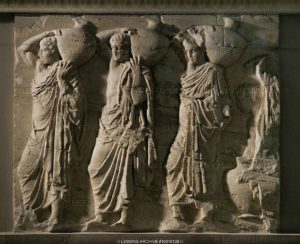
The wonderful thing about researching history is that I’m always learning new things. The most aggravating thing about researching history is that I’m always learning new things too late.
I hate it when I find something new I could’ve used in my past books.
For example, I recently learned that the Romans had a god of farts and BMs called (wait for it) CREPITUS! I would’ve totally used that in Hades Speaks! Actually, I probably wouldn’t have since I couldn’t find confirmation in any sources, but still.
They could’ve, right?
I’m constantly learning new things. The latest? That the Romans boiled their water before drinking!
I thought that boiling water was a thoroughly modern practice. After all, we have germ theory. They did not. We understand that it’s necessary to boil water when there’s some question of its suitability.
Yet even without understanding the microbial world, ancient Romans figured out that boiled water was healthier to consume. Pliny the Elder even gives a recommendation for purifying water: “The best corrective of unwholesome water is to boil it down to one half.” (Natural Histories, 31.23)
He also claims that it was “the Emperor Nero’s invention to boil water, and then enclose it in glass vessels and cool it in snow; a method which ensures all the enjoyment of a cold beverage, without any of the inconveniences resulting from the use of snow.”
By any inconveniences, I imagine he means the “runs” or diarrhea.
 In Justinian’s Digest, he mentions a “bronze vessel” used for boiling wine and water as part of an inheritance of a villa. That’s two solid sources claiming this.
In Justinian’s Digest, he mentions a “bronze vessel” used for boiling wine and water as part of an inheritance of a villa. That’s two solid sources claiming this.
Knowing this wouldn’t have made much difference in Cleopatra’s Moon because a princess of Egypt—even when taken to Rome—would have little knowledge of how her water would’ve been safeguarded. Others would’ve taken care of that for her.
But it would’ve shown up in my Pompeii novels.
For example, in A Day of Fire, I have a scene where young Caecilius makes a comment about a puzzling water shortage in Pompeii. I might have worked in the fact that people were getting sick because folks weren’t boiling their water as long in order to conserve what they had.
Or maybe not. It’s not that interesting a detail.
Still, I would have definitely made use of this fact in Curses and Smoke: A Novel of Pompeii because Tag, the male protagonist, is a medical slave in a gladiatorial school. He would’ve made use of boiled water in the drinks and herbal tinctures he prepared for injured fighters.
Perhaps it’s better that I didn’t talk about this because surely some reader would’ve excoriated me for claiming that the Romans boiled water when “everybody knows” they didn’t. But our penchant for holding on to old beliefs is another post.
I recently learned another factoid I could’ve used in Curses. Lucia, the female protagonists, gets away from her father in one scene by stealing his horse while on the road. I had her step up on an unmoving carriage wheel to mount the stallion. It turns out she would’ve merely stepped up on a stone block called a gomphus instead. These stones were placed on Roman roads at regular intervals for just that purpose.
These small details wouldn’t have made much of a difference to the story arcs in my novels. Yet like all historical writers, I want to get things right as much as possible.
I wonder what little factoid I’ll stumble upon next?



I can SO relate! I learned so much when I went on tour for my novel – things I wish I’d known beforehand so that I could have included it! Argh! I suppose that’s why we must keep writing! 🙂